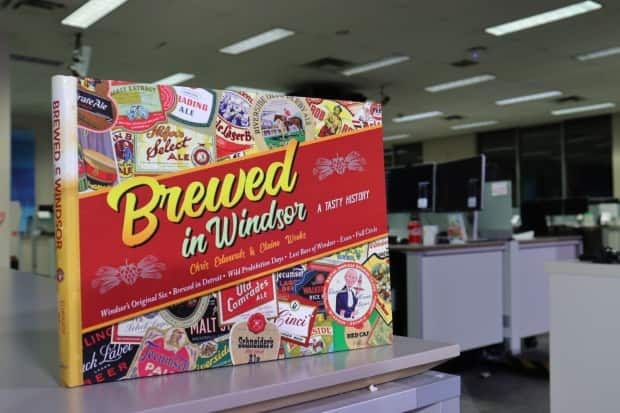Local authors tap into Windsor's love of beer

"What's on tap?"
Usually if you ask that question at a local bar, you'll be met with a variety of brew types made right in your own backyard.
Published in October, Brewed in Windsor: A Tasty History details Windsor-Essex's intimate relationship with beer, from the prohibition days all the way to the present market.
While the region is often known for its wineries and vineyards, not many know about its history with brewed ales.
The book's authors, Chris Edwards and Elaine Weeks, told CBC News they put the book together after their friend Bill Marentette died in January.
"Bill was a collector of Windsor beer memorabilia," Edwards said, adding that Marentette had previously asked them to publish a book with him on the topic.
"We decided to put a book together this winter, we had a lot of time on our hands so it's a tribute to Bill's work and his life."
After gathering some fast facts from Edwards and Weeks, CBC Windsor has decided to put you to the test to see what you know about local beer and breweries.

How much do you know about Windsor's beer history?
True or False: Windsor-Essex has 6 micro breweries.
This is false — Windsor-Essex has 14 microbreweries. In the past, there were six major breweries.
The six micro breweries that exist in Windsor today include: Sandwich Brewing Co., Brew Microbrewery, Craftheads Brewing Company, Walkerville Brewery, Chapter Two Brewing Company and Motor Craft Ales.
"You might think [that's] a lot but for a town the size of Windsor to have six breweries is pretty phenomenal," Edwards said.
True or False: Kegs of beer were poured through a hose from Riverside Brewery into the Detroit River when the company closed.
This is true.
According to reporting from the Windsor Star in 1935, when the brewery closed up a hose was dropped into the Detroit River and poured out the beer in the warehouse to "secure a rebate on malt taxes."
Three inspectors from the Ontario Liquor Control Board, according to Star reporting in the book, were present to ensure that the beer was actually destroyed in order to provide the rebate.
How was alcohol smuggled cross the Detroit River?
According to Edwards, it was cars and boats.
"They had these cars that would go across the ice, it was very dangerous. They had fleets of boats, people would smuggle any way they could," he said, adding that those who made the alcohol would change the shape as flat bottles were easier to ship.
People found that these flat-shaped bottles were easier to hide under their clothes and smuggle that way.
True or False: The 9/11 attacks led many Windsor bars and nightclubs to close.
This is true.
According to Edwards and Weeks, tightened border measures after the Sept. 11 World Trade Center attacks meant fewer American visitors came to Windsor to drink. This meant many spaces lost business and closed down.
Before then, many came across from Ohio and Michigan because of the younger drinking age in Canada (19) compared to the United States (21).


